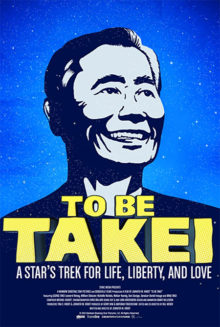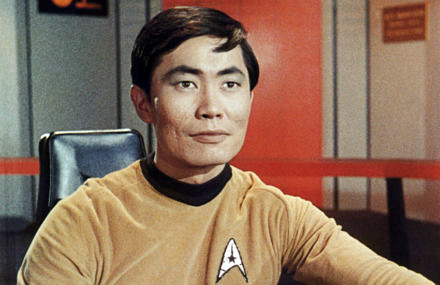 To Be Takei
To Be Takei
Directed by Jennifer M. Kroot
Premiered January 18, 2014 at the Sundance Film Festival
Documentary (biography)
94 min.
Amazon • trailer • imdb • official site
Review by Stephen O. Murray
January 12, 2018.
In 1942, George Takei (born in 1937) and the rest of his family were taken under armed guard from Lose Angeles to the Rohwer concentration camp in southeastern Arkansas.
This trauma was only exacerbated by their being transferred to the highest security internment camp for Japanese Americans suspected as being disloyal. The semantics through which Takei’s father was classified as “disloyal” were not as tragic but similar to those that set off the killings and manhunt for Gregorio Cortez in 1901, with plenty of similar racism.
Jennifer Kroot’s 2014 documentary on the man who was Lt. Sulu in the original Star Trek and through six Star Trek movies includes stills of some of the signs displayed in West Coast locations against the return of those “relocated” against their will without the slightest shred of evidence of treason by Franklin Delano Roosevelt, the real villain of the show, rather than the buffoonish William Shatner, who did not even learn how to pronounce “Takei” (rhymes with OK) in half a century of working together (Shatner rhymes it with guy instead of with gay).
 Though Lt. (eventually Capt.) Hikaru Sulu is the defining role of Takei’s acting career, he has long been involved in politics, active in the election of African American mayor Tom Bradley as mayor of Los Angeles, serving on a transit board for eleven years, advocating official apology (which was made by Ronald Reagan) for the internment of Japanese Americans during WWII, and, after (belatedly) coming out as gay and in a longtime relationship with a man (Brad, who took the last name of “Takei” when they wed in 2008) as an advocate for equal rights. He also launched a very popular Facebook page with 8 million followers.
Though Lt. (eventually Capt.) Hikaru Sulu is the defining role of Takei’s acting career, he has long been involved in politics, active in the election of African American mayor Tom Bradley as mayor of Los Angeles, serving on a transit board for eleven years, advocating official apology (which was made by Ronald Reagan) for the internment of Japanese Americans during WWII, and, after (belatedly) coming out as gay and in a longtime relationship with a man (Brad, who took the last name of “Takei” when they wed in 2008) as an advocate for equal rights. He also launched a very popular Facebook page with 8 million followers.
Takei’s calendar remains full. While the documentary was being shot, he was involved in a musical about his family’s concentration camp experience, Allegiance, which I don’t think reached Broadway.
B. D. Wong, John Cho, Telly Leung, and Dan Savage discuss Takei’s importance as a role model, the first Asian American in a non-stereotypical role on television. Takei expresses regret about being talked in to stereotypical roles in two Jerry Lewis movies (by his Asian American agent).
There are many scenes of George and Brad as an old married couple (bickering but very supportive of each other) and poignant material about both men’s relationships with their parents.
I’ve seen zero of the TV Star Trek episodes and only the first movie, so I am proof that the documentary is only of interest to Trekkies, though I found that what Shatner and Leonard Nimoy have to say about the manga “slash” drawings and stories of a sexual relationship between Kirk and Spock (and the I think manufactured Takei-Shatner feud) interesting.
I was reminded what a deep voice Takei has and saw that he smiles and laughs a lot (not infrequently at himself and his worry-wart husband and manager, Brad, who does not look to be a generation younger than Takei though he is by 17 or 18 years) and remains svelte (the two met in an L.A. gay running club, but Brad has slowed down and “filled out,” for which he is ribbed by George).
Some appearances in TV series that Netflix streams:
- “The Encounter” on The Twilight Zone (5:31), 1964
- “By Hooker by Crook” on Miami Vice (3:20), 1987
- “The Bottom Like is Murder” on Murder, She Wrote (3:15), 1987)
©2018, Stephen O. Murray

